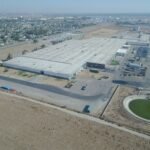Introduction to AI in Manufacturing
Artificial Intelligence (AI) is rapidly emerging as a game-changing technology in the manufacturing sector, driving substantial enhancements in various operational processes. At its core, AI refers to the capability of machines to mimic human intelligence, learning from data, and making informed decisions. The advent of machine learning and advanced data analysis techniques has paved the way for significant transformations in traditional factory workflows. These technologies facilitate the automation of routine tasks, allowing manufacturers to focus on more strategic initiatives.
The growing significance of AI in manufacturing can be attributed to its ability to streamline operations and optimize workflow. AI algorithms analyze immense volumes of data in real-time, providing actionable insights that were previously unattainable. This capability not only accelerates decision-making but also empowers manufacturers to predict potential operational challenges before they escalate into costly issues. For instance, predictive maintenance powered by AI can foresee equipment malfunctions, thereby minimizing downtime and extending the lifespan of machinery.
Moreover, AI enhances overall operational efficiency, leading to substantial cost savings across the board. By automating repetitive processes, manufacturers can allocate human resources more effectively and improve productivity. The integration of AI technologies also contributes to improved product quality. AI systems are capable of monitoring production standards and rectifying deviations instantly, resulting in consistent and high-quality outcomes. This commitment to quality can ultimately strengthen customer satisfaction and brand loyalty.
As the manufacturing landscape continues to evolve, integrating AI into factory operations is no longer optional but necessary. These advancements are not only optimizing workflow but are also setting a new standard for what is achievable in manufacturing efficiency and quality control. The next sections of this blog post will delve deeper into specific AI applications and their transformative impact on factory operations.
Key AI Technologies Driving Workflow Optimization
Artificial Intelligence (AI) has transformed various industries, with manufacturing being no exception. Key AI technologies, such as predictive maintenance, process automation, and AI-driven analytics, are pivotal in optimizing factory workflows. These technologies not only streamline operations but also enhance productivity and reduce costs.
Predictive maintenance leverages machine learning algorithms to analyze data from equipment sensors. By identifying patterns and anomalies in machinery operation, predictive maintenance enables manufacturers to anticipate failures before they occur. For instance, General Electric employs AI-driven predictive maintenance systems that have significantly decreased downtime and maintenance costs across their factories. This proactive approach allows for scheduled maintenance, reducing unexpected interruptions and optimizing overall equipment performance.
Process automation uses AI to facilitate various manufacturing tasks, ranging from assembly lines to inventory management. Robotic process automation (RPA) integrates software robots with human tasks, replacing repetitive processes and allowing human employees to focus on more complex responsibilities. Companies like Tesla utilize advanced AI robotics to automate parts of their production lines, enhancing efficiency and ensuring consistent quality in their automobiles.
AI-driven analytics is another critical technology that enables manufacturers to optimize their workflows. By analyzing large volumes of data collected from production processes, AI-driven analytics provides insights into operational efficiency. This information supports data-driven decision-making, enabling organizations to identify bottlenecks and optimize production schedules. For example, Siemens has successfully implemented AI analytics into their manufacturing process, resulting in informed strategic adjustments that boost productivity.
These AI technologies collectively contribute to a more efficient manufacturing process. By integrating predictive maintenance, process automation, and AI-driven analytics, factories can not only improve their operational efficiency but also ensure sustainable growth in an increasingly competitive market.
Challenges and Considerations in Implementing AI
Integrating artificial intelligence (AI) into factory workflows presents a unique set of challenges that manufacturers must navigate to optimize their operations. One significant obstacle is the inherent resistance to change among employees. Many workers may be apprehensive about adopting new technologies, fearing job loss or changes in their roles. To address this concern, organizations should focus on fostering a culture of innovation where employees are educated about the benefits of AI, showcasing how it can enhance their work rather than replace it. This educational approach serves not only to alleviate fears but also to empower staff and encourage their active participation in the transition process.
In addition, the need for a skilled workforce capable of operating sophisticated AI systems cannot be underestimated. The successful implementation of AI relies heavily on employees who possess the necessary expertise in data analytics, machine learning, and software development. Manufacturers may find it beneficial to invest in training programs to upskill their existing workforce or to collaborate with educational institutions to cultivate a pipeline of talent equipped with relevant skills. This proactive investment can significantly mitigate the skills gap and foster confidence in handling advanced technologies.
Data security is another critical concern when integrating AI into manufacturing operations. With the increasing reliance on data-driven insights, companies must prioritize robust cybersecurity measures to protect sensitive information. Establishing comprehensive data governance policies, conducting regular audits, and employing advanced encryption methods are crucial steps in safeguarding data integrity and confidentiality.
Moreover, the initial costs associated with adopting AI technologies can be daunting. While the long-term benefits often outweigh these upfront expenditures, many businesses may struggle to justify the investments. To navigate this challenge, organizations can adopt a phased approach, beginning with small-scale AI projects that demonstrate clear returns on investment. This allows manufacturers to gradually scale their AI initiatives while maintaining financial viability.
The Future of AI in Factory Workflow Optimization
As the manufacturing landscape continues to evolve, the role of artificial intelligence (AI) in optimizing factory workflows is set to become increasingly significant. One of the notable trends on the horizon is the rise of collaborative robots, often referred to as cobots. These robots are designed to work alongside human employees, enhancing productivity while ensuring safety. Cobots leverage AI algorithms to adapt to the tasks being performed, allowing for seamless integration into various manufacturing processes. This collaboration fosters an environment where human innovation complements robotic efficiency, ultimately leading to more streamlined operations.
Advancements in AI algorithms themselves are expected to dramatically enhance their capabilities. Machine learning techniques will enable systems to analyze vast datasets more effectively, identifying patterns and producing insights that were previously unattainable. This predictive analysis will aid in anticipating maintenance needs and optimizing supply chain logistics, thereby reducing downtime and increasing overall efficiency. As these algorithms continue to mature, we can expect them to support more complex decision-making processes, optimizing every aspect of factory workflow.
Moreover, the growing emphasis on sustainability will reshape the way factories operate. Manufacturers are beginning to recognize the importance of environmentally friendly practices, and AI can play a pivotal role in this transition. With intelligent systems capable of monitoring energy usage and minimizing waste, factories can enhance their operational efficiency while reducing their environmental impact. This alignment with sustainable practices not only caters to regulatory requirements but also meets the increasing demand from consumers for responsible manufacturing.
In conclusion, the future of factory workflow optimization through AI appears promising, characterized by the integration of collaborative robotics, advancements in machine learning, and a heightened focus on sustainability. As these trends evolve, the manufacturing industry will need to embrace ongoing innovation and adaptation to fully harness the potential that AI offers, ensuring that factories remain competitive in an ever-changing landscape.







